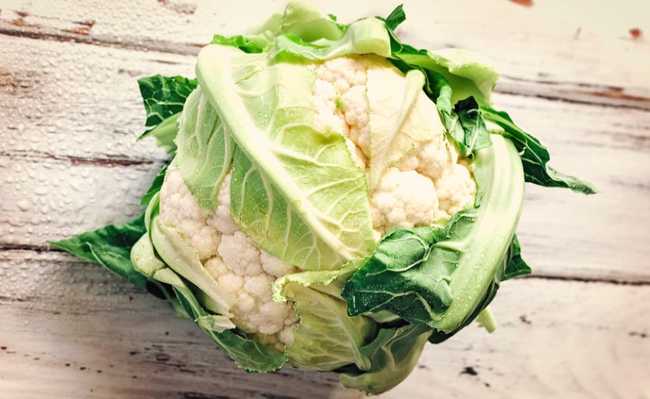Ten benefits of cauliflower for health
Cauliflower works as an ally in the fight against cancer, weight loss and provides even more benefits

Jennifer Schmidt image on Unsplash
Cauliflower is a vegetable of the brassicaceous or cruciferous family, the same as broccoli. Vegetables deserve to be always present in the diet because they have a large amount of nutrients, such as vitamin C, manganese, vitamins B5, B6, folate (B9) and vitamin K. Cauliflower also has antioxidant substances and other phytochemicals.
The vegetable is among the top 20 scored on the Aggregate Nutrient Density Index (ANDI), which measures the amount of vitamins, minerals and phytonutrient content in relation to the caloric content. This means that food provides a lot of nutrients for a small amount of calories. Versatility describes the cauliflower, you can eat it raw in salads, cook, or even make a puree.
When choosing fresh cauliflower, look for one that is firm, free of yellowish or brownish stains, and has green leaves attached to the stem. Store the whole vegetable with the stem facing down in the refrigerator in a plastic bag that allows ventilation so as not to accumulate water. Therefore, it should last for about five days.
Cauliflower Benefits
The benefits of cauliflower include weight loss, feeling full due to its fiber, preventing cancer, improving the digestive system and improving memory, among others. Check out ten of its most impressive benefits below:
1. Prevents some types of cancer
Cauliflower contains antioxidants that help prevent cell mutations and reduce the effect of free radicals. One of them is indole-3-carbinol or I3C, which is found in vegetables of the cruciferous family, and according to several studies, it has been shown to reduce four types of cancer: breast, endometrial, cervical and prostate.
Recent studies show that foods containing sulforaphane, a sulfur compound, are potential allies against cancer, especially melanoma, esophageal, prostate, and pancreatic cancers. The substance is what gives cruciferous vegetables their bitter taste and has been studied to kill cancer stem cells, thus delaying the growth of tumors.
2. Improves heart health
The sulforaphane present in cauliflower and other cruciferous vegetables has also been studied to improve heart health. The substance has the ability to increase antioxidant defenses and intracellular detoxifying proteins, thus protecting blood vessels and reducing damage to cells caused by excess sugar. A study by the Federal University of Rio Grande do Sul investigated the effects of sulforaphane on cardiac remodeling after myocardial infarction.
3. It is anti-inflammatory
Cauliflower has a large number of anti-inflammatory nutrients. They act at the cellular level, preventing inflammatory responses from the start. It acts to regulate the immune system and inflammation, thereby lowering the risk of related diseases such as cardiovascular disease, diabetes, cancer, and obesity.
4. It is rich in vitamins and minerals
Oftentimes, with fast foods on a daily basis, we do not ingest the necessary amount of nutrients, creating a shortage that ends up being compensated with multivitamins. Eating cauliflower regularly is a simple way to get these much-needed nutrients for your body. For example, a serving of cauliflower contains 77% of the recommended daily value of vitamin C. It is also a good source of potassium, protein, thiamine, riboflavin, niacin, magnesium, phosphorus, fiber, vitamin B6, folic acid, pantothenic acid and manganese.
- Vitamins: types, needs and times of intake
5. Boosts your brain health
Cauliflower is a good source of choline, a very important and versatile vitamin known for its role in brain development. Choline intake helps sleep, learning and memory. The substance also helps maintain the structure of cell membranes, aids in the transmission of nerve impulses and helps in the absorption of fat.
6. Helps in detox
Cauliflower helps your body to detoxify. It has substances that help the physique to excrete toxins. It contains glucosinolates and thiocyanates that increase the liver's ability to neutralize toxic substances, as well as other enzymes that help detoxify such as quinone reductase, glutathione transferase and glucuronosyl transferase.
7. Provides digestive benefits
Cauliflower is rich in fiber and water content, so it helps to prevent constipation, maintain a healthy digestive system and thus lower the risk of colon cancer. In addition, sulforaphane helps protect the stomach lining and prevents bacterial overgrowth. Helicobacter pylori , which cause stomach disorders.
8. It has antioxidants and phytonutrients
Eating cauliflower will ensure you get plenty of antioxidants and phytonutrients. Vitamin C, beta-carotene, kaempferol, quercetin, rutin, cinnamic acid, and more.
If you consume these micronutrients, your body will be able to resist aging caused by exposure to pollutants, chronic stress, and more. Not having a diet rich in these free radical-fighting nutrients can result in damage such as organ damage.
9. Makes bones strong
Cauliflower is a food rich in vitamin K. Studies have linked low vitamin K intake with an increased risk of bone fracture and osteoporosis. Adequate intake of the vitamin improves the health of your bones as it improves calcium absorption and reduces urinary calcium excretion.










